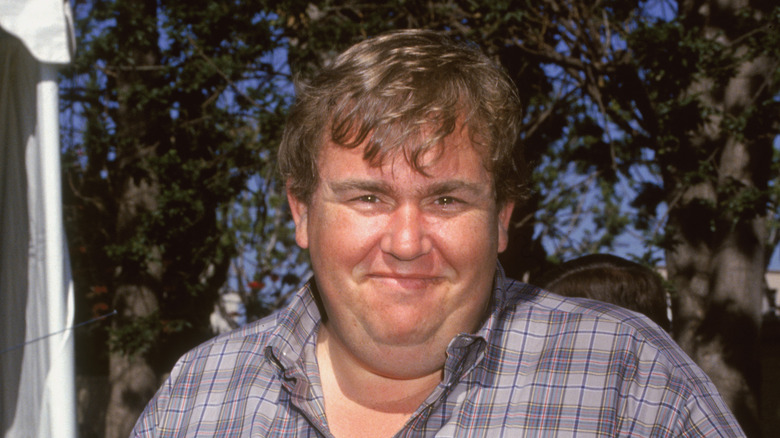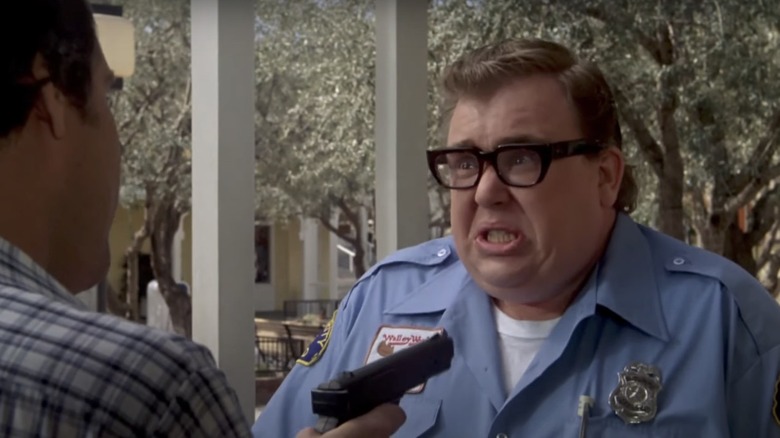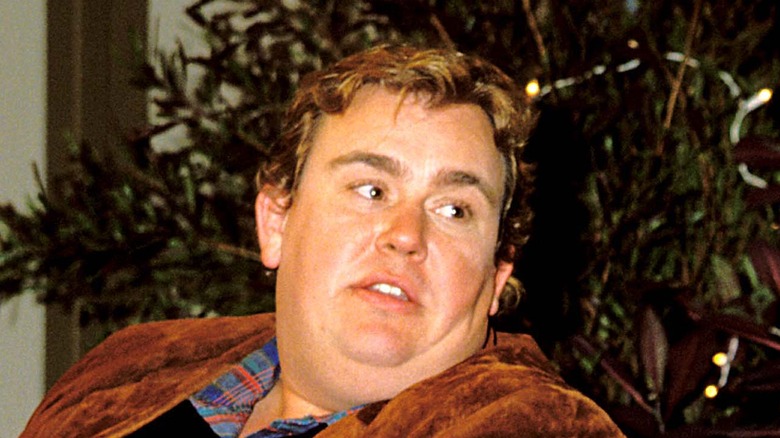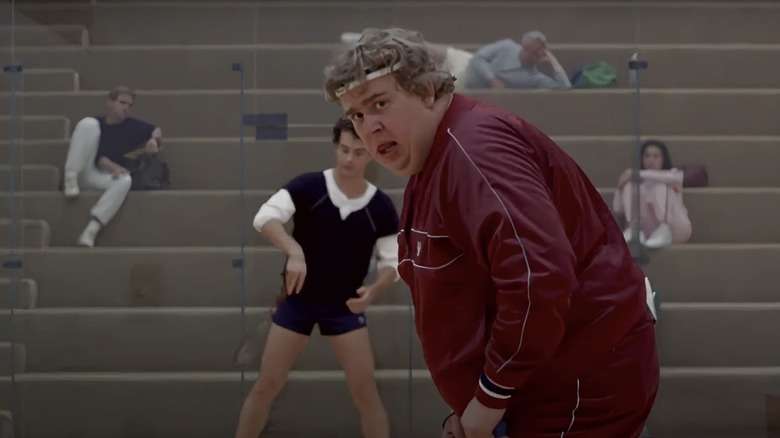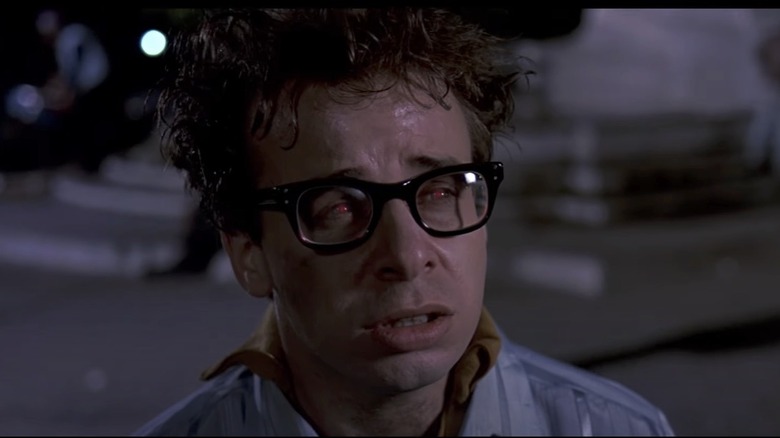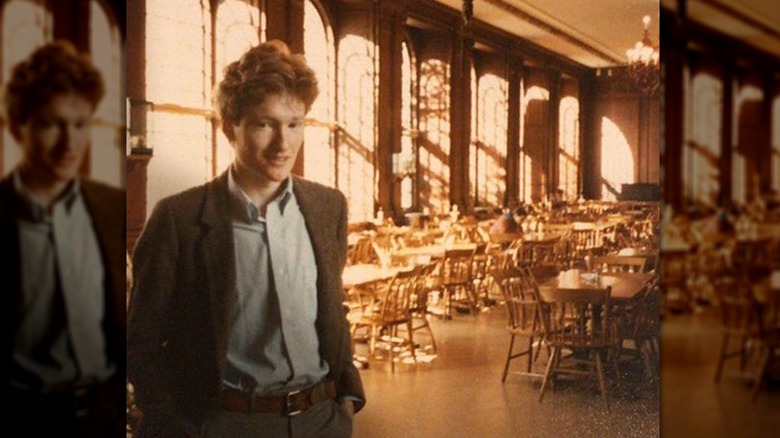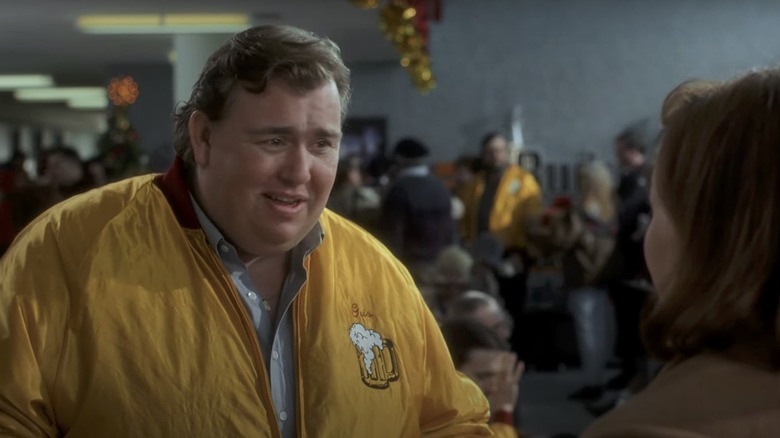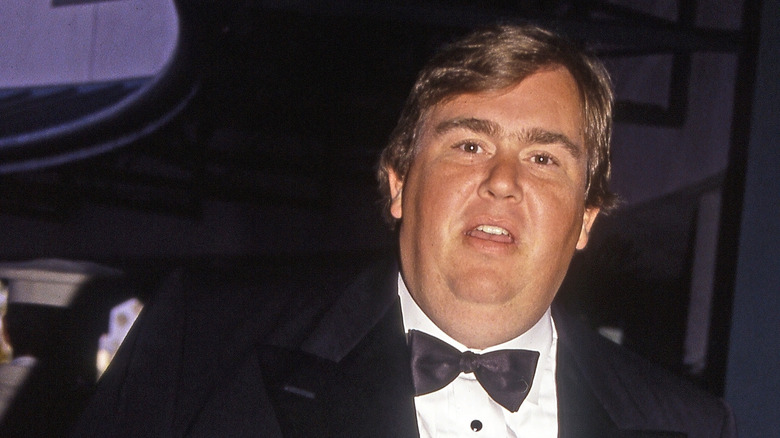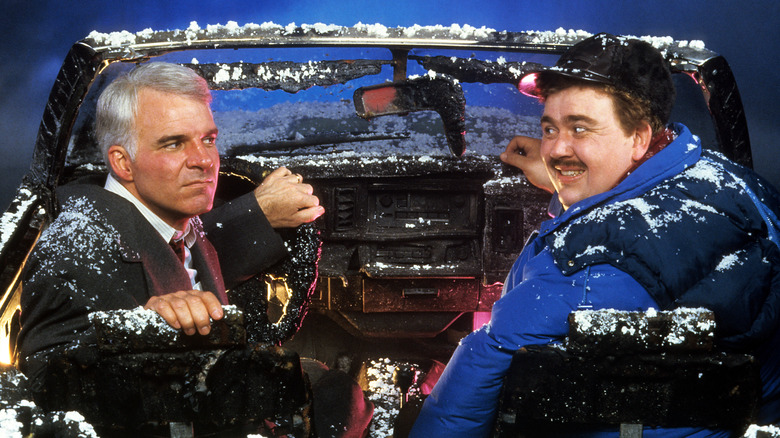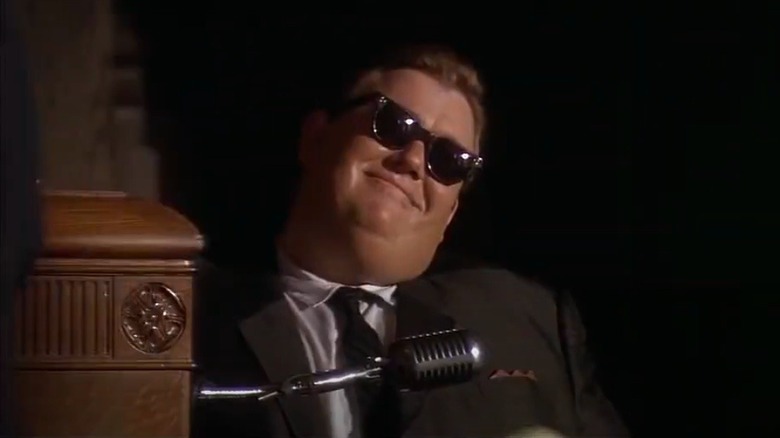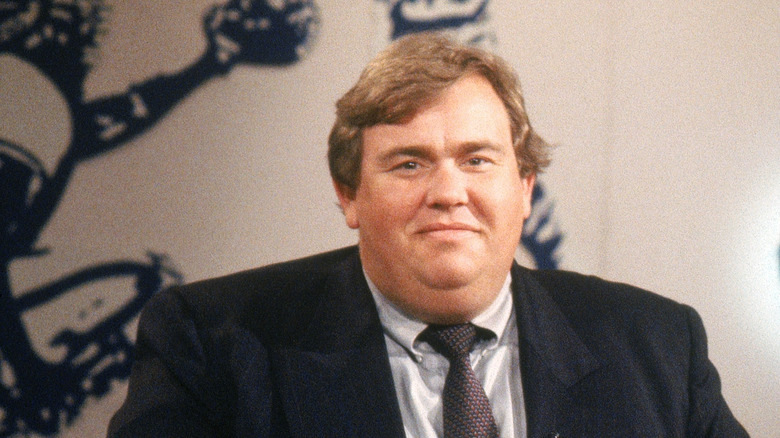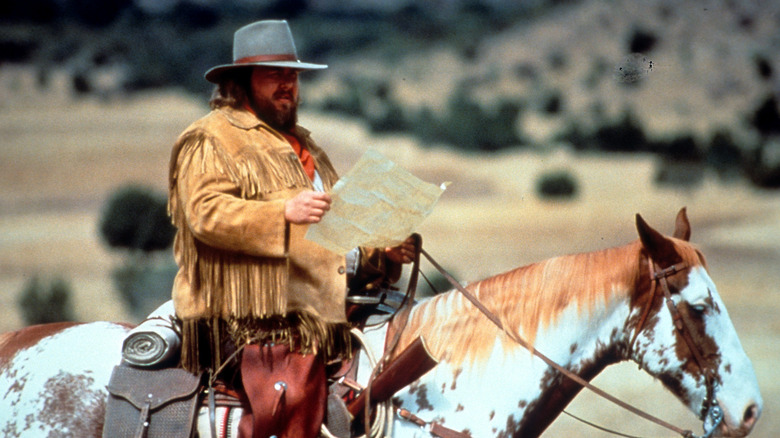Things We Learned About John Candy After He Died
Toronto native John Candy exploded onto the comedy scene in the late 1970s via Canadian comedy series "SCTV." A standout on the cult hit, Candy introduced television viewers to a weirdly eclectic array of now-iconic characters, ranging from showbiz sleazeball Johnny LaRue to 3D horror star Dr. Tongue, and Yosh Shmenge, one half of legendary Leutonian polka duo The Schmenge Brothers. As the show's popularity grew, Candy quickly became its breakout star. It wasn't long before Hollywood came calling, casting Candy in small but hugely memorable movie roles. Before long, he became the secret weapon in numerous film comedies, nailing scene-stealing supporting roles in "Stripes," "Splash," "National Lampoon's Vacation," and many more. With that foundation laid, Candy was soon tapped to star in his own movies, resulting in such comedy hits as "Planes, Trains and Automobiles," and "Uncle Buck."
By the early 1990s, Candy had become a beloved figure within the entertainment landscape. Sadly, on March 4, 1994, his life was cut short when Candy tragically had a fatal heart attack on the set of comedy western "Wagons East," while shooting on location in Mexico. He was just 43.
Gone but not forgotten, three decades after his death, the work he left behind continues to bring laughter to new generations. Meanwhile, there have also been some posthumous revelations that have shed new light on this comedy giant. With that in mind, here are some fascinating facts about John Candy that we didn't learn until after his death.
He wasn't originally supposed to be in National Lampoon's Vacation
One of John Candy's most memorable film roles was also one of his earliest, playing a theme park security guard during a climactic sequence in 1983 hit "National Lampoon's Vacation." In the film, beleaguered Clark Griswold (Chevy Chase) and his family finally arrive at their destination, Walley World, after a misfortune-plagued road trip. The family's elation, however, is immediately flattened when Candy's character nonchalantly informs them that the park is closed for renovations. Clark snaps, pulling a gun on the guy and holding him hostage, forcing him at gunpoint to take the Griswolds on all the park's rides.
That scene, however, was a last-minute addition. In DVD commentary recorded after Candy's death, "Vacation" director Harold Ramis revealed that the initial ending featured the Griswolds confronting Walley World founder Ray Walley — which flopped with audiences during test screenings. Ramis realized he'd screwed up by asking viewers to invest in the Griswolds' quest to get to Walley World, only to deny the payoff of actually making it there. Ramis asked screenwriter John Hughes to write the new scene.
"We cast John Candy in the part of the security guard, and that became the end sequence," said Ramis in the DVD commentary, (via Entertainment Weekly). "We edited it, we attached it to the film, we tested it, and then the test marketing went through the roof ... the rethink kind of saved the picture in a big way."
The real reason John Candy turned down SNL
"SCTV" evolved from the Toronto company of Second City, from which "Saturday Night Live" creator Lorne Michaels (and fellow Canadian) plucked Dan Aykroyd and Gilda Radner for his cast, while Bill Murray and doomed comedy legend John Belushi cut their improv teeth in Second City's Chicago company. In fact, the "SCTV" actors and "SNL" stars knew each other well before the existence of either show due to cross-pollination between the Toronto and Chicago companies. When NBC exec Dick Ebersol took over "SNL" after its disastrous 1980-'81 season under producer Jean Doumanian, he sought out established comedy talent and was eager to poach John Candy and Catherine O'Hara from "SCTV."
"Candy, who friends say was mortified at being caught in the middle of the tug of war between 'Saturday Night' and 'SCTV,' retreated to his farm, refusing to answer his telephone," wrote Doug Hill in his 1986 book "Saturday Night: A Backstage History of Saturday Night Live," noting that Candy ultimately remained with "SCTV."
While Candy neither confirmed nor denied that account before his death, his daughter, Jennifer Candy-Sullivan, has insisted there was another reason underlying his decision to pass on the "SNL" offer. "The other thing about my dad, is that he was the ultimate family guy," she told Today in 2024. "That's the reason he didn't want to do 'Saturday Night Live.' He knew the lifestyle wasn't going to be healthy for him. He was smart in that way."
He showed up drunk to the set of Splash after an all-nighter with Jack Nicholson
Another memorable supporting role for John Candy was portraying Freddie, brother of protagonist Allen Bauer (played by future Oscar-winner Tom Hanks) in the mermaid comedy "Splash." In one memorable scene the brothers play racquetball, with Candy's character hilariously out of breath, sweating and panting while drinking a beer and puffing on a cigarette.
Years after Candy's death, "Splash" director Ron Howard recalled that the day that scene was shot, Candy showed up late and revealed he was drunk. Speaking on the YouTube series "Reunited Apart," Howard revealed Candy's explanation. "Here's what happened, I'm telling you the truth: I'm at the bar and Jack Nicholson is at the bar. Jack Nicholson knew my name, Ron! And he starts buying me drinks," Candy said, as recalled by Howard. "I said, 'But I've got to go shoot. And [Nicholson] said, 'You're going to be all right, kid. Don't worry about it.' And he kept buying me drinks. I never went to bed, Ron. I never went to bed.'"
Appearing on "The Rich Eisen Show," "Splash" producer Brian Grazer noted that Candy's combination of being drunk and hungover actually worked for the scene; in fact, when Candy served the ball and then beaned himself in the forehead, he nailed it in one take because he was too dazed to get out of the way. "The night with Nicholson," mused Grazer, "I think he overdid it."
He was supposed to play Rick Moranis' character in Ghostbusters but turned it down
John Candy's "SCTV" co-star Rick Moranis shone in an unforgettable supporting role in "Ghostbusters" as nebbishy accountant Louis Tully, who becomes possessed by a supernatural Sumerian entity. While it's difficult to imagine any other actor in the role, "Ghostbusters" director Ivan Reitman revealed that the part was actually written specifically for Candy, whom he'd just worked with in "Stripes." When Reitman sent Candy the "Ghostbusters" script, however, he couldn't quite wrap his head around the character.
"John didn't get it. He kept saying, 'Hey, well, maybe can I do him with a German accent?' And I was a little hesitant right away. I said, 'That's kind of an odd thing. It's a very American, New York-based movie.' He was looking for a handle, and we got into the very uncomfortable conversation and finally, it was clear that he was not going to do it," Reitman recalled during a retrospective interview about the 1984 movie.
Left scrambling by Candy's decision to take a pass, Reitman quickly devised a Plan B. "I literally called Rick Moranis the same day and sent him the script the same day that Candy had turned it down," Reitman continued. "Rick called me like two hours after he got it, and he said, 'Please thank Candy for turning this down. This is amazing. I know what to do with this.'"
Harvard student Conan O'Brien once escorted John Candy around the campus
"SCTV" was a seminal influence on Conan O'Brien, and he was a huge fan of John Candy. While attending Harvard, O'Brien had the opportunity to spend a day with Candy, showing him around the campus. Recalling that experience in an episode of his podcast, "Conan O'Brien Needs a Friend," he confirmed that Candy lived up to all his expectations. "He was the John Candy that I was hoping he would be, times 10," O'Brien gushed.
O'Brien also recalled that day when he appeared on "The Howard Stern Show." O'Brien remembered that Candy was on the Pritikin diet at the time, and he'd been charged with keeping an eye on what Candy ate. That, however, went out the window when Candy pulled him into a Cambridge pastry shop and began loading up on eclairs. "And he sees me looking at him, and he nudges me and he goes, 'Don't worry kid — they're Pritikin eclairs!'" Years later, Candy's son discovered a photo that his father had taken of O'Brien at Harvard, which O'Brien shared via a post on X (formerly known as Twitter).
O'Brien also recalled an exchange with Candy that continued to resonate with him. "I said to him, you know, Mr. Candy, I'm thinking I might try comedy,'" O'Brien said. "His head whipped around, he looked me right in the eye, and he said, 'You don't try comedy. You do it, or you don't do it.' And that hit me very powerfully."
John Candy's Home Alone cameo was filmed in under 24 hours — and only earned him 400 bucks
Another of John Candy's memorable bit parts came in "Home Alone," as Gus Polinski — aka "polka king of the midwest" — who helps Kevin McCallister's mom (Catherine O'Hara) get home to Chicago after flights are grounded. Candy's cameo, entirely improvised, was shot in a marathon 22-hour session. "[Director] Chris [Columbus] told me later how we couldn't use most of it," O'Hara told Chicago magazine in 2015. "He laughed and said, 'You're supposed to be looking for your kid, and you're just having a good time with these guys in a truck.'"
"Home Alone" screenwriter John Hughes offered Candy a small portion of the film's profits as thanks, but he refused. "John Candy did that as a favor to us," former studio exec Tom Jacobson confirmed in Netflix's "The Movies That Made Us" (via Australia's News.com). Instead, he was paid just $414.
When the movie eventually went on to rake in over $280 million at the box office, Candy came to regret his decision and reportedly harbored bitterness for years. "There was certainly a little resentment on John's part," Columbus said in a 2020 interview with Business Insider. "I don't know if John ever got any kind of compensation from Fox. We did a movie together after that, 'Only the Lonely,' and there were a couple times on set when he would make a cutting remark about Fox and what he was paid."
He hated watching himself onscreen at movie premieres
Before his untimely death at age 43, John Candy had become one of the most popular comedians of the 1980s and through the '90s. While it was clear that fans absolutely adored watching him in these film and television productions, that was not a feeling that he shared.
"He put a lot of effort and love into everything he did, but he didn't like going to the premieres," the late comedian's son, Chris Candy, revealed to The Hollywood Reporter. The reason, he explained, was because his father couldn't stand to see himself on screen when there was an audience present. "He had a hard time watching the final product," he added, but insisted that his father had no issues critiquing his own performance in a private setting. "I remember watching dailies with him," he said. "He didn't have a hard time watching himself in that manner."
As his daughter, Jen Candy-Sullivan, added, he'd often enlist his wife to attend movie screenings so that she could then fill him in on how they went. "He would send Mom [to screenings] and she would come back and tell him where [the audience] laughed, what they laughed at," she said.
He invited the cast of Planes, Trains and Automobiles to watch the Oscars in his hotel room — and paid for room service
In addition to his comedic gifts, John Candy is also remembered for his generosity. Stories abound illustrating his generous spirit, both to individuals and to charitable organizations. Candy's magnanimity is illustrated by a posthumous anecdote shared by an actor who had a bit part in "Trains, Planes and Automobiles."
Interviewed by Vanity Fair, Troy Stevens, who had a one-line role as "antisocial trucker," recalled sitting in his hotel room watching TV when he received a phone call from Candy, who invited him to join him and some of the film's other actors to watch the Oscars. Stevens recalled cleaning himself up in the expectation that he'd be joining the likes of director John Hughes and co-star Steve Martin. When he arrived, however, he discovered they weren't there. "Who was there was everybody who was like me on the movie," he explained. "He went through all the down-the-ladder actors and invited them all up to his suite. Isn't that wonderful? And then he got like, a thousand dollars' worth of room service. He got like 20 pizzas, and just the food just kept coming all evening."
After the Oscars ended and the party broke up, Stevens tried to contribute $200 for all the food. Candy would not have it. "And I'll remember this on my deathbed," he said. "John Candy said, 'Troy, that's been taken care of.'"
Kevin Costner fought to keep John Candy's JFK role from being exiled to the cutting room floor
Had John Candy lived longer, he likely would have taken on more roles demonstrating his versatility as an actor. He did, however, leave behind a rare dramatic performance in Oliver Stone's "JFK," portraying a shady New Orleans lawyer. As Candy's daughter, Jen Candy-Sullivan, told The Hollywood Reporter, he put a lot of effort into that minor part. "He worked so hard on that," she said. "He had a dialect coach, and he worked night and day on that script. He was so worried about it, getting that accent down."
That confirms the account of author Martin Knelman in his biography, "Laughing on the Outside: The Life of John Candy." "Candy had just a small part in 'JFK,' but he was nervous about it, as it was a dramatic role in a serious movie," wrote Knelman, who contended that Candy's excellent performance wound up becoming overshadowed by the sprawling, all-star cast and the controversy that engulfed the film.
In fact, Candy's part was nearly cut from the film. "A trailer with Candy in it had already been released when Oliver Stone decided to edit Candy out. Candy was devastated when he heard about this," Knelman wrote. The film's star, Kevin Costner, was so peeved that he fought hard until Stone eventually agreed to leave Candy's part intact. "In the end," Knelman wrote, "Candy received a handwritten letter of apology from Stone."
He came to feel like a rejected 'dog boy' in Hollywood
It's fair to say that John Candy's career had its ebbs and flows; for every "Uncle Buck" and "Planes, Trains and Automobiles" there were bombs like "Who's Harry Crumb?" and "Nothing But Trouble." During one of those low periods, Candy was in a Calgary hotel preparing to start production on "Cool Runnings" when he contacted screenwriter Tommy Swerdlow, who was staying in the same hotel.
Swerdlow recalled (via Substack) visiting Candy in his room. Candy, he wrote, had just come off a string of bombs and was desperate for a hit that would put him back on top. "I need this thing to be really good. Understand? I need it to be really good for me," Candy implored, quickly sinking into despair. "I'm nobody. I'm nobody in this town ... I'm nothing ... I'm nobody. I'm dog boy. I'm dog boy in this town ..." he lamented.
Looking back on the encounter, Swerdlow observed that Candy was going through a kind of "withdrawal" after being knocked down a few rungs on the Hollywood ladder. "Poor guy was a mess," Swerdlow wrote. "The big offers had dried up ... Only someone who has experienced that kind love and adoration can so deeply feel its absence." As Swerdlow pointed out, "Cool Runnings" was released in October 1993, becoming a modest hit that earned largely positive reviews for Candy — who died just a few months later.
John Candy never took a vacation because of his fear that he'd never work again
Despite his stardom and apparent bravado, John Candy was desperately uncertain about his future in Hollywood, worried that his career was on a downward spiral and he'd never again reach the peaks he'd hit just a few years earlier. By the time he'd come to his final film, "Wagons East," he'd been working non-stop for years, cranking out one film after another.
Candy confided to his "Cool Runnings" co-star Malik Yoba that he'd never once taken a vacation since he began making movies. "He said it was because he was afraid he'd never work again," Yoba told The Independent. "He was very insecure about his place in the Hollywood ecosystem. Most people would never imagine that would be the case for the great John Candy — but it was."
"Cool Runnings" director Jon Turteltaub confirmed Yoba's account, but insisted Candy's insecurities extended far deeper than Hollywood. "I know he had fears about his career and how he was perceived by people," Turtletaub explained. "His whole life, John hated not being liked. He was afraid of it on a personal and professional level." In fact, Turteltaub pointed out that underlying fear explained why Candy could never turn down a request for an autograph, or to pose for a photo with a fan. "John had trouble doing that because he felt like a bad person if he didn't," he said. "That eats away at a person."
